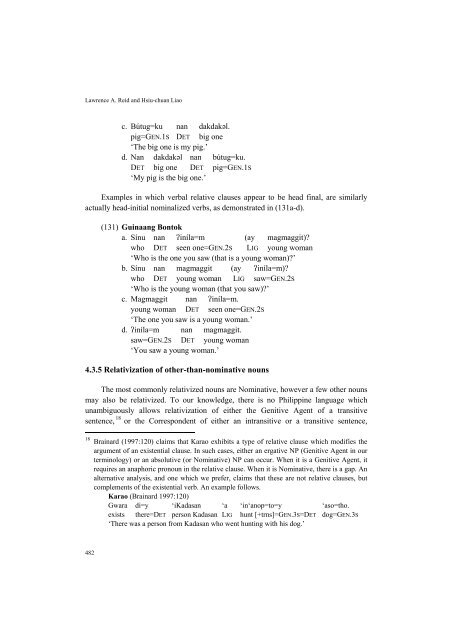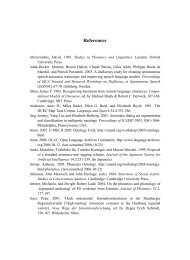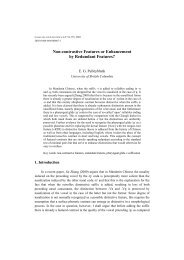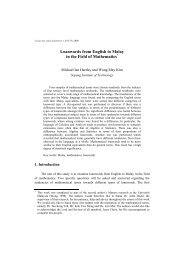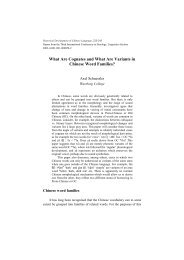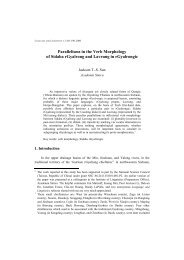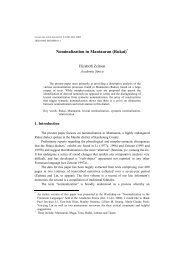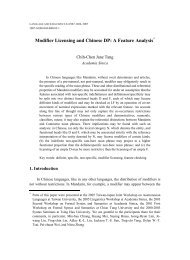A Brief Syntactic Typology of Philippine Languages - Academia Sinica
A Brief Syntactic Typology of Philippine Languages - Academia Sinica
A Brief Syntactic Typology of Philippine Languages - Academia Sinica
You also want an ePaper? Increase the reach of your titles
YUMPU automatically turns print PDFs into web optimized ePapers that Google loves.
Lawrence A. Reid and Hsiu-chuan Liao<br />
482<br />
c. Bútug=ku nan dakdakəl.<br />
pig=GEN.1S DET big one<br />
‘The big one is my pig.’<br />
d. Nan dakdakəl nan bútug=ku.<br />
DET big one DET pig=GEN.1S<br />
‘My pig is the big one.’<br />
Examples in which verbal relative clauses appear to be head final, are similarly<br />
actually head-initial nominalized verbs, as demonstrated in (131a-d).<br />
(131) Guinaang Bontok<br />
a. Sínu nan /iníla=m (ay magmaggit)?<br />
who DET seen one=GEN.2S LIG young woman<br />
‘Who is the one you saw (that is a young woman)?’<br />
b. Sínu nan magmaggit (ay /iníla=m)?<br />
who DET young woman LIG saw=GEN.2S<br />
‘Who is the young woman (that you saw)?’<br />
c. Magmaggit nan /iníla=m.<br />
young woman DET seen one=GEN.2S<br />
‘The one you saw is a young woman.’<br />
d. /iníla=m nan magmaggit.<br />
saw=GEN.2S DET young woman<br />
‘You saw a young woman.’<br />
4.3.5 Relativization <strong>of</strong> other-than-nominative nouns<br />
The most commonly relativized nouns are Nominative, however a few other nouns<br />
may also be relativized. To our knowledge, there is no <strong>Philippine</strong> language which<br />
unambiguously allows relativization <strong>of</strong> either the Genitive Agent <strong>of</strong> a transitive<br />
sentence, 18 or the Correspondent <strong>of</strong> either an intransitive or a transitive sentence,<br />
18 Brainard (1997:120) claims that Karao exhibits a type <strong>of</strong> relative clause which modifies the<br />
argument <strong>of</strong> an existential clause. In such cases, either an ergative NP (Genitive Agent in our<br />
terminology) or an absolutive (or Nominative) NP can occur. When it is a Genitive Agent, it<br />
requires an anaphoric pronoun in the relative clause. When it is Nominative, there is a gap. An<br />
alternative analysis, and one which we prefer, claims that these are not relative clauses, but<br />
complements <strong>of</strong> the existential verb. An example follows.<br />
Karao (Brainard 1997:120)<br />
Gwara di=y ‘iKadasan ‘a ‘in‘anop=to=y ‘aso=tho.<br />
exists there=DET person Kadasan LIG hunt [+trns]=GEN.3S=DET dog=GEN.3S<br />
‘There was a person from Kadasan who went hunting with his dog.’


